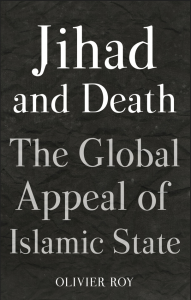 This post is a continuation from Jihad and Death, the global appeal of Islamic State.
This post is a continuation from Jihad and Death, the global appeal of Islamic State.
–o0o–
Far from being religious zealots, a large number of those involved in terrorism do not practise their faith regularly. Many lack religious literacy and could actually be regarded as religious novices. Very few have been brought up in strongly religious households, and there is a higher than average proportion of converts. Some are involved in drug-taking, drinking alcohol and visiting prostitutes. MI5 says there is evidence that a well-established religious identity actually protects against violent radicalisation. (Alan Travis, “MI5 Report Challenges Views on Terrorism in Britain,” The Guardian, 20 August 2008).
As a result of the above MI5 conclusion and similar findings by other professional researchers Olivier Roy concludes in Jihad and Death
But as we have seen, jihadis do not descend into violence after poring over the sacred texts. They do not have the necessary religious culture—and, above all, care little about having one. They do not become radicals because they have misread the texts or because they have been manipulated. They are radicals because they choose to be, because only radicalism appeals to them. No matter what database is taken as a reference, the paucity of religious knowledge among jihadis is patent. (p. 42)
Yet often we read commentaries by persons who seek explanations for terrorism in the religious texts of Islam. After all, those texts are within easy reach and would appear to offer easy answers. There is a problem, however. Reading sacred texts is not analysing the minds and personalities of the terrorists themselves. Roy himself puts part of the blame for this misguided approach on “the profound secularization of both our societies and our knowledge” so that we end up having “only a textual approach to religion, disregarding what [he calls] religiosity.”
Theology basically involves interpreting scriptures in a comprehensive discursive system that isolates dogma from all the rest: emotion, imagination, aesthetics, and so on. But what is at work here is precisely religiosity — in other words, the way in which the believer experiences religion and appropriates elements of theology, practices, imaginaries, and rites, to construct a transcendency for himself — and not religion. In the case of the jihadi, this construction places him in contempt of life: his own and that of others. (pp. 42-43, my bolding in all quotations)
Incantatory logic
The jihadi is infused less with “the methodological tradition of exegesis of the Prophets” than with visions of heroism and violence. The theology provides a veneer of “proof-texting” (my term, not Roy’s) rationalization for those visions. Such verses become incantations, or a Christian fundamentalist’s “proof-texts” or ideological slogans.
When young jihadis speak of “truth,” it is never in reference to discursive knowledge. They are referring to their own certainty, sometimes supported by an incantatory reference to the shuyukh, the sheikhs, whom they have never read. In them they thus find whatever they put there themselves. The linkage between their imaginary and science is brought about by two things: terminology (peppering ones French or English with Arabic words) and the brutal, non-discursive affirmation of a verse or a hadith, made up of one or two sentences at most, such as the famous verse: “Do not take the Jews and the Christians as allies. They are allies of one another.” Short texts such as these are thrown up in peoples faces (just as the Red Guards threw Mao quotes in each others faces), without ever referring to other texts, let alone seeking a more overall logical significance. . . . . Radicals talk less about religion than Salafis do: their posts and their texts revolve more around action than religion. The circulation of religious texts is secondary with al-Qaeda, central in ISIS propaganda, incantatory among radicals. Their reading material is found mostly on the internet: al-Awlaki is very popular because he speaks English. (pp. 43-44)
The Avenging Hero
The “imaginary” that Olivier Roy believes to be the true interest of the jihadi terrorist is primarily that of “the avenging hero of the suffering Muslim community”. On what does he base this view? On what the terrorists themselves say. The same themes recur with them but Roy takes the words of the leader of the group responsible for the July 2005 London bombings, Mohammed Siddique Khan, as representative of their motivations:
1. Khan begins by citing the atrocities of the Western nations against the “Muslim people” (in the transcript he says, “my people all over the world”);
2. next, Kahn announces himself as fulfilling the role of the avenging hero (“I am directly responsible for protecting and avenging my Muslim brothers and sisters,” “Now you too will taste the reality of this situation”);
3. finally, he announces his love of death (“We love death as much as you love life”), and his confidence of entering heaven (“May Allah … raise me amongst those whom I love like the prophets, the messengers, the martyrs,” etc.).
The same vengeance motivation was dramatized by ISIS executioners when they made their victims suffer the same way as Muslims (e.g. wearing Guantanamo dress, being burned alive or blown up). Continue reading “Jihad and Death, part 2. “The Avenging Hero of the Suffering Muslim Community””
Like this:
Like Loading...





